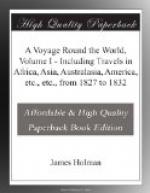Thursday, 19.—There was a fine southerly breeze to-day, and we crossed the equinoctial line this forenoon, without observing the usual custom of shaving, having gone through that ceremony on passing the tropic, before we arrived at Sierra Leone, not expecting, at that time, the Eden would have occasion to cross the equinoctial line. Latitude, at noon, 0 deg. 6’. S. steering W. by S. with the wind south. There have been numberless flying-fish, with a few bonetas and dolphins sporting round the ship at times, to-day; men-of-war are not very successful in taking these fish, but in a low, dull sailing merchant-vessel, it is otherwise, particularly if she is not coppered, and has been sometime in a warm climate. I consider the dolphin and flying-fish to be exceedingly palatable food, but the boneta is strongly flavoured, and very close grained, approaching to the solidity of animal flesh.
Sunday, 21.—Latitude, at noon, 28 deg. 19’. S. Still a fresh trade-wind, but as we advanced from the Bight of Biafra into the Southern Atlantic Ocean, increasing our distance, at the same time, from the continent of Africa, we found the wind gradually drawing from the westward of south, to the eastward of south, until it arrived at that point (S.E.), which is the prevailing trade-wind of the Southern Atlantic, from the equinoctial line to about the 28th degree of south latitude, varying a few degrees from these extremes, according to the season of the year. Being now in the regular trade-wind, I shall not think it necessary to trouble my readers with any farther remarks on the common routine of the duties of a ship, until we come within sight of Ascension,
Whose rocky shores to the glad sailor’s
eye
Reflect the gleams of morning.
Having run for this little island in the middle of the ocean, during the night, we saw it immediately on the break of day, of Wednesday, 25th, within a mile of the computed distance, viz. three or four leagues. At eight, we anchored in N.W. Bay, in eleven fathoms water, about half a mile from the landing-place, when the Governor, Lieut.-Colonel Nichols, came on board; and after breakfast. Captain Owen and myself accompanied him on shore, in the gig. We landed with facility, there being very little surf, and some marines ready to run the boat upon the beach the moment she touched the ground. The officers of the establishment were prepared to receive us, and we were introduced to them individually. We first visited the mess-room, which, with some apartments attached to it for the officers’ quarters, is one of three buildings that are distinct from the general establishment, called Regent Square. The second building is a store-house, containing provisions for the African squadron, as well as the persons employed on the island; and the third, a house that was built for the Governor, but which Colonel Nichols allows Lieutenant Stanwell to reside in, he being a married




